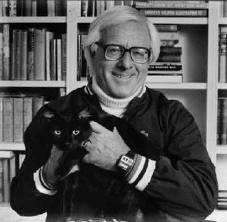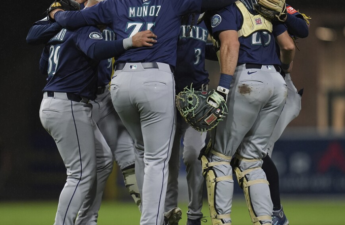
I didn’t have to look up Ray Bradbury’s birth year for the title of this post. I have read his biography at the back of countless books, visited the park named for him in Waukegan, Illinois, his birthplace and rearing grounds, the site of his beloved tales of a childhood run in a freer era before the fear of real bogeymen kept children penned in to replace imagination with television. He was neo-luddite, shunning driving and the Internet and distraction in all its forms, preferring the tribulation of daily sessions at the typewriter amongst his toys and dinosaur models and planets on a string.
He was my favorite author and is, more than any other human being, the reason I wanted to write. The reason I want to write. His essay “Make Haste to Live,” an afterword to one of his recent collections (Quicker Than the Eye) is a siren call to all humans, but especially those who hope to chronicle our experience in semi-permanent language. He is, as described here responsible for the name of this website. (It occurs to me that I badly need to update that particular page, as with much of the site that carries a tribute to the recently deceased.)
It is not lost on me that this occurs on the day I have long dubbed “Mortality Day,” though reports appear to indicate that his actual date of death was yesterday, June 5th. I had a vividly intense dream some years into this life about dying on June 6th and subsequently my maternal grandfather died on this date in 1991, which only emphasized the significance of the dream and the date. It is the date imprinted with the memory of the storming of Normandy, the day I made my first will in 2006. I have spent much of my adult life using this day as my personal time to contemplate the nature of having a fixed temporal lifetime in this form and all the incumbent implications that most of us set aside each and every day we’re not directly confronted with it.
Ray Bradbury himself was bequeathed into my life by death, the tragic one of my cousin (with whom I shared the grandfather who died in 1991), Buster Nicholson, in a single-person plane-crash in August 1988. Having recently graduated from Stanford, Buster was an avid flier with a love of the movie “Top Gun” and an earlier younger penchant for Bradbury’s rocket-bound heights. Consensus was that the box of paperback novels, heavily laden with Bradbury titles, would naturally go to the eight-year-old reader in the family and it didn’t take long for me to see what Buster was so intrigued by when he opened these books a few years earlier.
I don’t recall exactly which book I read first, but I was through several tomes of short stories by the time I was deciding that Bradbury could well eclipse C.S. Lewis as my favorite writer of all-time. Though it wasn’t until seventh grade that I was assigned Fahrenheit 451, not among Buster’s collection, and was so engrossed that I finished the entire work in the first night when we were designated the first chapter. I tried to coyly imply where things might be headed in the next day’s class discussion before giving too much away and sheepishly admitting that I’d been unable to stop myself. Never before had I been so enthralled by a book – to this day, I’m not sure I’ve ever read such a weighty work in literally one sitting before or since.
Many of the short stories I wrote in high school were heavily cribbed from the style of Bradbury, as well as his unique blend of science fiction, coincidence, philosophy, and oddity. I have never so deeply wanted to write like someone as him… and while I think I’ve crafted a more individual style, there is no doubt that many of its roots are still embedded in the Martian landscape and calliope call of Ray’s universe. He alone understood the import and thrall of Halloween, the essence of October, the power of intuition, the promise of the all-night writing session in the sheer hold of a simple idea. Having never met the man, never coming close, I have never felt like I’ve had a closer mentor and personal advisor on the very nature and concept of writing than Ray Bradbury. And while this may seem strange to feel so powerfully personally linked with someone so distant, I feel that Ray himself would understand and relate, finding his own inspiration from those who wrote before him, truly getting like few others how momentous the transmission of feeling and reality can be through the written word.
He had a full life, one not skimped or cut short, having broken into writing quite early and making the most of it throughout. He had been heartbroken since the death of his wife a few years back, writing of the experience movingly. It is hard to feel the pang of tragedy or the sting of unfairness in this particular passing. And yet I hold firm that the occasion of death ought not be a celebration, but a reflection. On this day, among all others, it must be doubly so. So let us remember his cautions, his warnings, to not be distracted by the wall-sized televisions he predicted long before their ubiquitous invitation into our homes. Let us remember the book, the power of the written word, to trump any such agent of propaganda or dissembling. Let us honor Ray Bradbury with a ride on a carousel, a walk in the park, a spin of the top. Let this Halloween chill the air like none other. Let us make haste to explore, to wonder, to chronicle, to live. Knowing all the while that our future will be just a bit bleaker for the lack of Ray’s narration.


